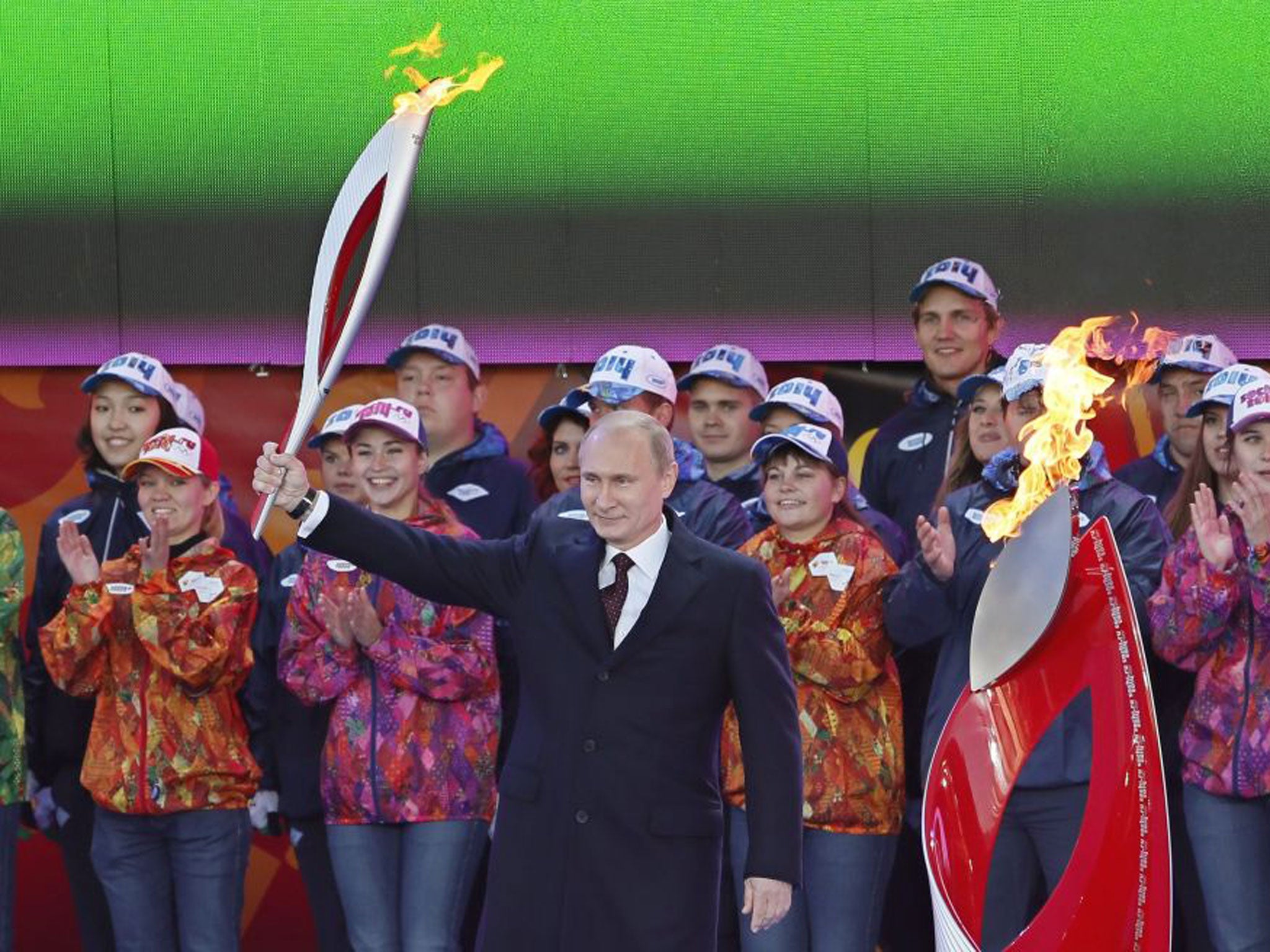2014 Sochi Winter Olympics: Corruption and censorship cast shadow over Russia's Games
Special report: Allegations of fraudulent contracts worth billions threaten to derail Putin’s showpiece

The 2014 Winter Olympics are meant to revitalise the city of Sochi, improve Russia’s image abroad, and become the cornerstone of President Vladimir Putin’s legacy.
But as the Olympic torch lights up Moscow on Monday, reports of widespread corruption and workers’ rights violations, as well as controversy over Russia’s crackdown on gay rights, cast a shadow over the Sochi Games.
With an estimated price tag of $51bn (£32bn), February 2014’s Winter Olympics in the Black Sea resort town of Sochi will be the most expensive in history, and critics say more than half that money may have gone towards embezzlement and kickbacks.
Today, synchronised swimmer Anastasia Davydova, a five-time Olympic gold medallist, will carry the Olympic flame through Moscow as it begins its 123-day journey through all of Russia’s 83 regions. At the same time, Amnesty International activists around the world will protest recent Russian laws that place strict regulations on demonstrations, require some non-governmental organisations to register as “foreign agents”, and ban “gay propaganda”, a vague term for any behaviour that is seen to promote homosexuality.
“The Olympic flame can cast light on human rights violations that the Russian regime wants to hide with pomp and circumstance,” Sergei Nikitin, head of Amnesty International in Moscow, told The Independent.
It remains unclear how Russian authorities will react to expressions of LGBT solidarity in Sochi, where officials have said the law will be in force. Gay speed skater Blake Skjellerup has said he will wear a rainbow pin during competition, and Moscow-based activists have said they will hold a gay-pride parade in Sochi on the opening day of the Olympics.
Meanwhile, Human Rights Watch reported this month that in mass raids beginning in early September, police in Sochi have detained hundreds of migrant workers, many of whom worked on Olympic construction sites, holding them in often inhumane conditions and deporting some of them.
In a February report, Human Rights Watch said it had documented the exploitation of migrant workers on construction sites including the Olympic Village, the main Olympic Stadium and the Central Media Centre. Workers’ wages were withheld, their identification documents confiscated and they were not provided with legally required contracts and work permits.
The Olympic infrastructure has been plagued by poor quality construction and mounting costs. The ski jump had to be rebuilt several times, and its cost skyrocketed from £24.8m to £165m. As a result, one of the six deputy heads of the Russian Olympic Committee, Akhmed Bilalov was fired, and a video of Putin berating him for failures on Olympic projects in February quickly went viral. A criminal case was opened against Mr Bilalov in April for allegedly spending more than £60,000 in company funds on luxury travel as director of a state company building ski resorts in other parts of the North Caucasus. He went to Germany for medical treatment a few days after Mr Putin’s tongue-lashing and has not returned to Russia.
Meanwhile, companies linked to members of Mr Putin’s inner circle appear to have profited handsomely. Notably, firms belonging to Putin’s childhood friend Arkady Rotenberg have won contracts worth $7.4bn, according to Bloomberg.
“According to the worldwide average for price increases, the cost of the Sochi Olympics should be $24bn (double the $12bn announced by Mr Putin). The rest – $26bn – is embezzlement and kickbacks,” wrote opposition figures Leonid Martynyuk and Boris Nemtsov in a May report.
In particular, the pair noted that the infamous road between the coastal and mountain clusters of Olympic venues grew in price from £1.8bn to £5.2bn over the course of construction – more than Nasa’s Curiosity Mars rover mission. Russian Railways, which built the road, told the Novaya Gazeta newspaper that the report did not make clear that railroad infrastructure was also part of the road project and that efforts to build the road faster and in a more environmentally-friendly manner raised the cost.
Valery Morozov, the head of Moskonversprom, a company that participated in several Olympic-related construction projects in Sochi, told Novaya Gazeta in 2010 that for a contract to rebuild part of a spa complex where a delegation will stay during the Games, he had to pay kickbacks and buy goods and services at inflated prices from companies linked to officials. Mr Morozov’s company was later accused of tax evasion, and received political asylum in the UK.
In particular, Mr Morozov told Novaya Gazeta that he had to give kickbacks totalling 12 per cent of the contract, or £4m, to Vladimir Leschevsky, who was deputy head of the Department of Presidential Affairs’ construction arm. Then-president Dmitry Medvedev ordered Russian prosecutors to open a criminal inquiry into Leschevsky, who was suspended, but the case was later closed.
Although several officials in Sochi face corruption charges, no one has been convicted of corruption directly related to Olympic construction.
All athletes’ phone calls to be monitored
Russia’s FSB security service plans to intercept the phone and data traffic of all athletes and spectators at the Winter Olympics in the resort of Sochi, according to Russian journalists.
Andrei Soldatov and Irina Borogan have collected dozens of government documents and public records showing amendments to phone and Wi-Fi networks in the Sochi area which will allow monitoring. Russia’s Sorm monitoring service will detect sensitive words, and people found using such words “can be tracked further”, said Soldatov.
Subscribe to Independent Premium to bookmark this article
Want to bookmark your favourite articles and stories to read or reference later? Start your Independent Premium subscription today.

Join our commenting forum
Join thought-provoking conversations, follow other Independent readers and see their replies